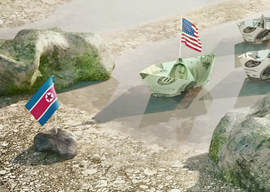
December 12, 2017

Source: Bigstock
While this area is regarded as vital to China, it is not to us. And while China, a littoral state that controls Hainan Island in that sea, is a legitimate claimant to many of its islets, we are claimants to none.
Vietnam, Malaysia, Singapore, Brunei, the Philippines and Taiwan are the other claimants. But though their interests in the fishing grounds and seabed resources may be as great as China’s, none has seen fit to challenge Beijing’s hegemony.
Why should we risk war with China to validate the claims of Communist Vietnam or Rodrigo Duterte’s ruthless regime in Manila? Why should their fight become our fight?
China’s interests in the sea are as crucial to her as were U.S. interests in the Caribbean when, a rising power in 1823, we declared the Monroe Doctrine. Over time, the world’s powers came to recognize and respect U.S. special interests in the Caribbean and Gulf of Mexico.
Given the steady rise of Chinese military power, the proximity of the islets to mainland China, the relative weakness and reluctance to confront of the other claimants, China will likely become the controlling power in the South China Sea, as we came to be the predominant power in the Western Hemisphere.
What we are witnessing in Crimea, across the Middle East, in the South China Sea, on the Korean peninsula, are nations more willing than we to sacrifice and take risks, because their interests there are far greater than ours.
What America needs is a new national consensus on what is vital to us and what is not, what we are willing to fight to defend and what we are not.
For this generation of Americans is not going to risk war, indefinitely, to sustain some Beltway elite’s idea of a “rules-based new world order.” After the Cold War, we entered a new world—and we need new red lines to replace the old.